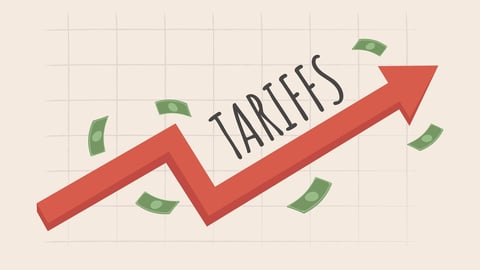Morningstar: Nike, Lululemon among firms with ‘very high’ exposure to new tariffs
Some companies are more vulnerable that others to the Trump Administration’s new reciprocal tariffs.
According to a note published on April 3 by financial services firm Morningstar, the new tariffs have significant implications for apparel manufacturers and retailers, as — based on trade associations and other sources — approximately 98% of clothing and 99% of footwear that is sold in the U.S. is imported, primarily from Asia.
In addition, department stores appear to be especially vulnerable as nearly all apparel, accessories and home goods sold in their stores are imported by either themselves or their vendors.
Morningstar senior equity analyst David Swartz, who wrote the note, does not have much hope that clothing and footwear production will return the United States in any meaningful way as a result of the tariffs.
“Apparel firms have invested vast amounts of capital and time in building their supply chains, and there is no way to rebuild them domestically at any reasonable cost in terms of money and time,” he wrote. “Moreover, wage rates and other costs are far higher in the U.S. than in the Asian and Latin America.”
[READ MORE: NRF: 2025 retail sales to grow 2.7% to 3.7% as spending slows]
The full Morningstar note is below.
The Trump administration announced tariffs on imports to the US that are materially higher than had been expected. This policy has significant implications for apparel manufacturers and retailers as, according to trade associations and other sources, approximately 98% of clothing and 99% of footwear that is sold in the US is imported, primarily from Asia.
Indeed, according to the United States Fashion Industry Association, about 60% of US apparel is supplied by just three Asian countries: China, Vietnam, and Bangladesh. These three nations were hit extremely hard by the new policy, as tariff rates were set at 54% for China, 46% for Vietnam, and 37% for Bangladesh. High tariffs were imposed on most other key apparel-sourcing countries in Southeast Asia as well.
We are not reducing our fair value estimates on apparel firms under our coverage at this time given that the duration of the new tariffs is unknown. If the tariffs prove to be short-lived, then we anticipate that the effect on the industry will be small. The Trump administration has frequently announced policies and then reversed them with little effect. If, however, the tariffs are in place for a prolonged period (such as a few months or more), then we anticipate that they will cut into operating margins and require price increases that will reduce demand.
There is also the possibility that a trade war will cause a recession in the U.S. and that multinationals will face retaliatory tariffs and trade restrictions in multiple countries.
Many sportswear firms, such as wide-moat Nike and narrow-moats Adidas, Lululemon, and Deckers, have very high exposure to the new tariffs, as China and Vietnam are key sourcing countries. It will be impossible for them to avoid the tariffs, especially as Vietnam has become the key producer of technical sports footwear.
Even so, Nike trades at a very large discount to our $112 per share fair value estimate and has the financial resources to overcome the near-term challenges.
Apparel retailers are also exposed to the new tariffs. No-moat Gap, for example, is both a retailer and a clothing designer and imports practically everything it sells. However, it trades at a sizable discount to our $28 per share fair value estimate, and Old Navy could benefit from a trade down by consumers to lower-priced apparel stores.
Further, department stores, such as no-moats Macy's and Kohl's, appear to be especially vulnerable as nearly all apparel, accessories, and home goods in their stores are imported by either themselves or their vendors.
Moreover, they lack pricing power, so price increases would likely reduce sales materially. Even so, Macy's and Kohl's own significant real estate and other assets, and we do not think that either is at risk of financial distress. Macy's and Kohl's trade at large discounts to our fair value estimates of $24 and $41, respectively.
One small positive from the tariff announcement is that tariffs of only 10% apply to Caribbean and Central American countries like Guatemala, Honduras and the Dominican Republic. Narrow-moat basic apparel firms Gildan and Hanesbrands operate supply chains in this region.
Ironically, Gildan has been moving production to Bangladesh to reduce costs, but it still mainly sources from Central America. We rate Hanesbrands as very attractive relative to our $16.30 valuation, and Gildan is now also trading below our fair value estimates of $50/ CAD 71.50.
Lastly, we see no realistic possibility that clothing and footwear production will return the United States in any meaningful way. Apparel firms have invested vast amounts of capital and time in building their supply chains, and there is no way to rebuild them domestically at any reasonable cost in terms of money and time.
Moreover, wage rates and other costs are far higher in the US than in the Asian and Latin America. As such, apparel firms have no incentive to invest in US production for tariffs that will likely be short-term in nature.




